Search the Special Collections and Archives Portal
Search Results
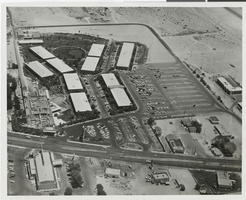
Aerial photograph of the Sands Hotel looking East (Las Vegas), early 1960s
Date
Archival Collection
Description
Aerial view of the Sands Hotel and adjacent property in the 1960s.
Site Name: Sands Hotel
Address: 3355 Las Vegas Boulevard South
Image
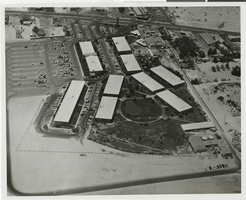
Aerial photograph of the Sands Hotel looking West (Las Vegas), early 1960s
Date
Archival Collection
Description
Aerial view of the Sands Hotel and adjacent property in the 1960s.
Site Name: Sands Hotel
Address: 3355 Las Vegas Boulevard South
Image
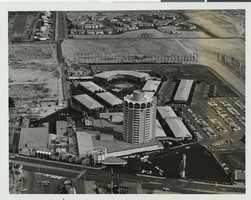
Aerial photograph of the Sands Hotel (Las Vegas), late 1960s
Date
Archival Collection
Description
Aerial view of the Sands Hotel after the addition of the tower. Stamped on original: "Las Vegas News Bureau. Las Vegas, Nevada,Convention Center. 12844, Don English, Jerry Abbott, Joe Buck, Milt Palmer, John Cook."
Site Name: Sands Hotel
Address: 3355 Las Vegas Boulevard South
Image
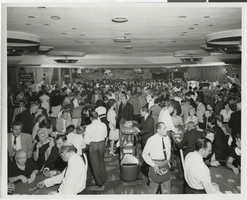
Photograph of the Sands Hotel casino interior (Las Vegas), 1959
Date
Archival Collection
Description
The interior of the Sands Casino in 1959. Stamped on original: "Las Vegas News Bureau. Las Vegas, Nevada, Convention Center. Photographers- Don English, Jerry Abbott, Joe Buck, Milt Palmer, 7906."
Site Name: Sands Hotel
Address: 3355 Las Vegas Boulevard South
Image
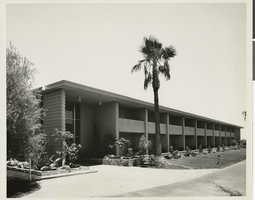
Photograph of the Hollywood Park guest wing at the Sands Hotel (Las Vegas), 1950s
Date
Archival Collection
Description
Hollywood Park - one of five two-story buildings which housed guests at the Sands in the 1950s. The five buildings were all named after famous American racetracks.
Site Name: Sands Hotel
Address: 3355 Las Vegas Boulevard South
Image
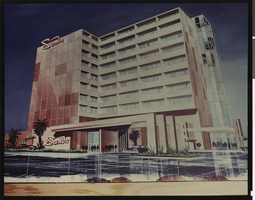
Photograph of an artist's rendering of a proposed high-rise building for the Sands Hotel (Las Vegas), 1961
Date
Archival Collection
Description
Artist's rendering of a proposed and unbuilt tower for the Sands.
Site Name: Sands Hotel
Address: 3355 Las Vegas Boulevard South
Image
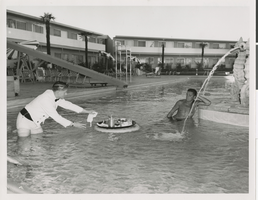
Photograph of a waiter serving breakfast in the Dunes Hotel swimming pool (Las Vegas), 1955
Date
Archival Collection
Description
Waiter in half-swim attire serving a guest in the pool. Stamped on original: "Las Vegas News Bureau. Las Vegas - Nevada. Photographers: Don English - Joe Buck - Jerry Abbott;" Staple holes in bottom left corner.
Site Name: Dunes Hotel
Address: 3355 Las Vegas Boulevard South
Image

Photograph of Wilbur Clark and Cadillac poolside at the Desert Inn (Las Vegas), mid 1950s
Date
Archival Collection
Description
Wilbur Clark standing next to a Cadillac by the Desert Inn Pool.
Site Name: Desert Inn
Address: 3045 Las Vegas Boulevard South
Image

Photograph of a painter touching up a model of the planned Desert Inn Hotel and Casino (Las Vegas), circa 1949
Date
Archival Collection
Description
Billboard showing the planned Desert Inn Hotel and Casino. Smudges of red paint left on photograph.
Site Name: Desert Inn
Address: 3045 Las Vegas Boulevard South
Image
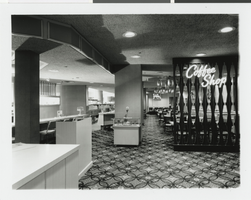
Photograph of the coffee shop in the Mint (Las Vegas), circa 1960
Date
Archival Collection
Description
An exterior view of the coffee shop inside of the Mint Hotel in downtown Las Vegas.
Site Name: Mint Las Vegas
Address: 128 East Fremont Street
Image
